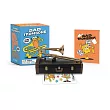The Child Gaze: Narrating Resistance in American Literature theorizes the child gaze as a narrative strategy for social critique in twentieth- and twenty-first-century US literature for children and adults. Through a range of texts, including James Baldwin’s Little Man, Little Man, Mildred D. Taylor’s Roll of Thunder, Hear My Cry, Toni Morrison’s The Bluest Eye, Gene Luen Yang’s American Born Chinese, and more, Amanda M. Greenwell focuses on children and their literal acts of looking. Detailing how these acts of looking direct the reader, she posits that the sightlines of children serve as signals to renegotiate hegemonic ideologies of race, ethnicity, creed, class, and gender. In her analysis, Greenwell shows how acts of looking constitute a flexible and effective narrative strategy, capable of operating across multiple points of view, focalizations, audiences, and forms.
Weaving together scholarship on the US child, visual culture studies, narrative theory, and other critical traditions, The Child Gaze explores the ways in which child acts of looking compel readers to look at and with a child character, whose gaze encourages critiques of privileged visions of national identity. Chapters investigate how child acts of looking allow texts to redraw circles of inclusion around the locus of the child gaze and mobilize childhood as a site of resistance. The powerful child gaze can thus disrupt dominant scripts of power, widening the lens through which belonging in the US can be understood.


 天天爆殺
天天爆殺  今日66折
今日66折 

























 博客來
博客來 博客來
博客來 博客來
博客來 博客來
博客來 博客來
博客來